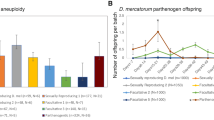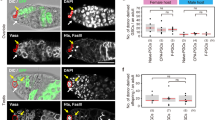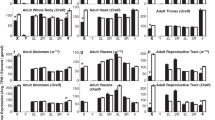Abstract
THE attempts to produce experimental mutations by chemical agents have hitherto been successful only to a small extent. The small effect may be due on one hand to the relative high chemical stability of genes and on the other to technical difficulties. The latter consist first of all in the fact that the methods usually applied do not bring the chemicals into direct and immediate contact with the germ-cells. If we feed chemical substances, we do not know what alterations in quantity and quality of the agent occur in the digestive tract and on the way from there to the gonads. Injection of the chemicals into the bloodstream or in the lymph is a better method ; but here, too, we do not know how long the substance applied remains at work unchanged. Here a further difficulty consists in the fact that larger doses are often lethal for the treated animal.
This is a preview of subscription content, access via your institution
Access options
Subscribe to this journal
Receive 51 print issues and online access
$199.00 per year
only $3.90 per issue
Buy this article
- Purchase on Springer Link
- Instant access to full article PDF
Prices may be subject to local taxes which are calculated during checkout
Similar content being viewed by others
References
Amer. Nat, 70 (1936).
Proc. U.S. Nat. Acad. Sci., 24 (1938).
Author information
Authors and Affiliations
Rights and permissions
About this article
Cite this article
HADORN, E., NIGGLI, H. Mutations in Drosophila after Chemical Treatment of Gonads In vitro. Nature 157, 162–163 (1946). https://doi.org/10.1038/157162a0
Issue Date:
DOI: https://doi.org/10.1038/157162a0
This article is cited by
-
Studies in mutagenesis in sugarcane
Proceedings / Indian Academy of Sciences (1968)
-
�ber m�gliche mutagene Nebenwirkungen von Arzneimitteln beim Menschen
Humangenetik (1965)
-
Melanotic tumours of drosophila: a partially-Mendelian character
Heredity (1962)
-
Induced mutation
Euphytica (1959)
-
The mutagenic action of pyronin in Drosophila
Zeitschrift f�r Vererbungslehre (1958)
Comments
By submitting a comment you agree to abide by our Terms and Community Guidelines. If you find something abusive or that does not comply with our terms or guidelines please flag it as inappropriate.



